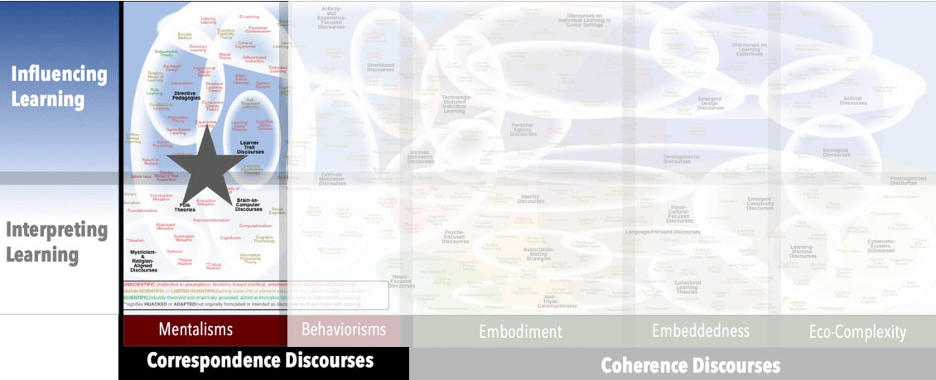Focus
Reasoned thought as the source of truthPrincipal Metaphors
- Knowledge is … scope of possible interpretation
- Knowing is … considered thought and action
- Learner is … a thinker
- Learning is … reasoning
- Teaching is … challenging (to think)
Originated
AncientSynopsis
The phrase a priori is Latin for “from the earlier” (and it is typically contrasted with a posteriori, Latin for “from the later” – compare: a posteriori Discourses). The term is used both to refer to truth claims that are reached by reasoned thought (e.g.., via deduction, tautologies, mathematics) and to categorize discourses that privilege argument over demonstration. Associated constructs include:- a priori Comparison/Contrast (Planned Comparison/Contrast) – any attempt to look for specific relationships or patterns in data that were collected for that purpose
- Possibilism – the suggestion that the “state of being possible” is sufficient to assert that an imagined entity exists, albeit in a less robust way than actual entities (compare: Actualism, under a posteriori Discourses)
- Middle-Range Theory – an umbrella category that includes any perspective aimed at integrating theoretical and empirical research – that is, a priori Discourses and a posteriori Discourses – on a specific phenomenon or within a specific domain of inquiry
Commentary
The phrase a priori is certainly useful for purposes of description and categorization of those discourses that assume separations of reasoned conclusion and observed evidence. As we aim to illustrate through this site, however, issues arise when it is coupled with a posteriori to generate a continuum that is imagined to span all claims to truth and all discourses on knowledge and learning.Subdiscourses:
- a priori Comparison/Contrast (Planned Comparison/Contrast)
- Middle-Range Theory
- Possibilism
Map Location

Please cite this article as:
Davis, B., & Francis, K. (2023). “a priori Discourses” in Discourses on Learning in Education. https://learningdiscourses.com.
⇦ Back to Map
⇦ Back to List
